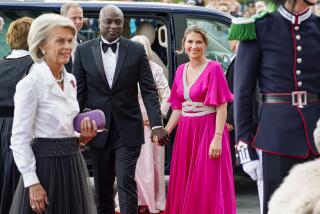When Love Is Never Having to Say ‘I Do’
STOCKHOLM — First comes love. Then comes marriage. Then comes junior in the baby carriage.
Not in Scandinavia, though. At least, not in that order.
The pragmatists who ushered premarital sex and living together into the Western mainstream have all but given up on marriage as a framework for family living, preferring cohabitation even after their children are born.
For decades, couples in Sweden, Norway, Denmark and Iceland have put their relationships to the test of sharing bathrooms and closet space before heading for the altar, usually marrying only when a baby was on the way.
But the 1990s witnessed a resolute rejection of marriage even among couples having children. By the end of the decade, more than half the babies in the region were born to unwed mothers--twice the ratio for continental Europe and nearly 60% more than in the United States.
Unmarried parents are now the norm for Scandinavian children, which doesn’t much bother sociologists or therapists here as long as the families stay together.
What does worry many is the markedly higher likelihood that unmarried couples will eventually separate and subject their children to emotional pain and feelings of guilt.
The concurrent trends toward fewer marriages and more breakups mean increasing numbers of children are growing up in one-parent households, potentially suffering emotional hardship--though in wealthy, welfare-cushioned Scandinavia it is seldom an economic one.
In fact, it is the region’s success in fostering gender equality and a sturdy social safety net that has created the atmosphere of independence that has encouraged many mothers to go it alone.
Now that outgrowth of the women’s movement and decades of social democratic government have ignited a fresh regional battle of the sexes and given rise to national movements demanding fathers’ rights.
“Because of the social welfare systems in Scandinavia, a woman has to be stupid not to realize that she has a better situation if she is not married,” says Erik Kofod, a founder of the Danish group Fathers in Support of Parents and Children. “It’s an appalling system that motivates people to do things that are unhealthy for society and for children.”
For most couples in the region, marriage has changed from the point of embarkation in a relationship to a destination the majority never reach. Marriage rates throughout Scandinavia have dropped from a 1950s high of about nine per 1,000 people per year to four per 1,000 in the 1990s. (The U.S. rate for 1998, the most recent year for which figures are available, was 8.3 per 1,000.) Of those Scandinavians who do marry, half divorce before their children reach age 18.
The most telling statistics are the ever-rising figures for births out of wedlock: 54% in Sweden, 49% in Norway, 46% in Denmark and a whopping 65% in Iceland, where religion has never held much sway with the population.
Those figures may be a condemnation of the traditional family model, but observers note that most newborns are still going home with two parents.
“Nearly 80% of small children live with both biological parents,” says Barbro Hedvall, who covers family issues for one of Sweden’s leading newspapers, Dagens Nyheter. And she says those couples who manage to stay together for four or five years after having a child tend eventually to get married, even if only to tidy up the legal loose ends for inheritance and pension purposes.
“If you look at wedding pictures nowadays, they’re more likely to show a bride and groom and three small children,” Hedvall notes. “This was once cause for an uproar, but today it is common middle-class behavior.”
Some Children Unsure of Parents’ Status
Ebba Witt-Brattstroem, a Stockholm University professor of comparative literature and mother of four sons, married the father of her three youngest children when she was pregnant with the second. She was single when she had her first child by a different father as a graduate student in 1979.
“For the children, it makes no difference whatsoever whether their parents are married or not,” she insists, adding that some friends of her sons aren’t even sure of their parents’ marital status.
“The most important family value is whether you are a good parent,” she says, adding that most people are mature enough to keep their children’s needs foremost in mind in the event of divorce or separation. “Traditional family values are not important to us anymore. They are something we do research on, like a fossil.”
With so many couples breaking up, Scandinavians have fallen into patterns of serial monogamy, even at the most public levels. When the Swedish finance and education ministers fell in love in late 1998, they put out news releases announcing the dissolution of their existing relationships, and then moved in together.
Some social scientists see the broad reluctance to marry as reflecting a more sober view of the institution than the one held by Americans, who often cling to romantic notions of love lasting forever.
“Rushing away on an impulse to get married--eloping--this is not a Scandinavian trait,” understates Agneta Stark, a sociologist at Sweden’s Linkoeping University. “You won’t find any 24-hour wedding chapels here.”
Others say the failure of marriage to survive as a model for contemporary family life is a consequence of excessive individualism fostered during the 1980s “Me Generation.”
“Our ultimate definition of freedom is to do your own thing, to be independent and not rely on anyone, even on spouses,” says Berger J. Hareide, director of the Lutheran Church-supported Marriage and Family Research Center near Oslo. “People have taken on a consumerist attitude toward relationships. ‘If you’re not happy with the one you’re in, get a new one.’ It’s very destructive.”
Courts Favor the Rights of the Mother
When unmarried couples with children separate, fathers tend to get short shrift from the courts in Scandinavia because tradition favors the rights of the mother, complain fathers’ rights advocates such as Rune Harald Raekken, chairman of the Joint Custody Assn. of Norway. He says only 30% of single fathers have regular contact with their children.
“If parents are not married and the relationship ends, it’s catastrophic for the fathers,” Raekken says. “Legal custody is skewed toward the mothers, and there are no legal bonds between the father and child. We have to change the laws, but more importantly, we have to change people’s attitudes. Every child has the right to two parents.”
He regrets that it is no longer shameful to have children out of wedlock, speculating that the failure to make a commitment at the start of family life leaves the door open for one partner’s departure when the going gets tough.
Norway’s divorce rate has actually stabilized over the past few years, but sociologists take little heart from that statistic because so many fewer couples are getting married in the first place. Over the past 30 years, marriages among women ages 20 to 24 have dropped from 23% a year to 3%, representing both a decrease in marriages and a tendency to marry later. The data also might suggest a rising animosity between men and women.
“The women’s liberation movement gave a lot of women bad self-esteem and unrealistic expectations for their lives,” says Kofod of the Danish fathers group, who, as a divorced father, has battled with his ex-wife for years over visitation with his 12-year-old son. “They think it has to be summer, good weather and happiness all the time. If you’re not happy with your job or your relationship, change it! That’s the signal that has been sent to women--that they have the right to be happy all the time.”
His organization offers advice to fathers seeking joint custody or visitation rights. The group has managed to get proposals before the Danish parliament that would automatically extend rights to both biological parents regardless of their marital status.
That pursuit has raised the ire of some feminists, who contend that mothers naturally have priority in determining a child’s welfare.
“People have to accept that there are biological differences between men and women. Women are always nine months ahead of men in relating to the child because they are the ones giving birth,” says Lone Noergaard, a leader of the Danish Women’s Society.
The Scandinavian resistance to marriage before a long trial period of living together is hailed, however, by one regional romantic as leading to a more meaningful compact between partners who have come to know each other well.
“I married my wife because I wanted to, not because society said I had to,” says Mathias Gardell, a political anthropologist here who wed after the seventh of the couple’s eight children was born.
Liss Hammerborg and Jan Tommy Kasin, both 38, have lived together near Oslo for 16 years and have an 8-year-old daughter, Ida, and 4-year-old son, Sondre. They rejected marriage when their relationship began because they felt it was an institution that encouraged partners to take each other for granted.
“Neither of us has ever had any romantic views on marriage,” says Hammerborg, who has had a lawyer work out custody and property issues in the event of either partner’s death.
But those responsible for administering social affairs in Scandinavia are deeply concerned about couples deciding against marriage after having children.
“Statistics show that parents who are not married are two to three times more likely to split up than those who are married,” says Valgerd Svarstad Haugland, Norway’s minister for children and family affairs.
She lauds the Scandinavian countries for their leading role in bringing women into the work force, fostering equality and creating a reliable social safety net. But those advances also have contributed to the demise of the traditional family, she concedes.
“We are becoming too selfish. I don’t think we work hard enough on the relationships between men and women,” she says. “It’s too easy nowadays to meet and go off with a new partner.”
Noting the waning influence of religion and the region’s liberal attitudes toward pre- and extramarital sex, she complains that Scandinavians have lost their moral compass amid the prosperity and ease of modern life. “I can only hope that we can one day turn around this trend,” she says.
But other women see the obsolescence of marriage as a natural evolution of society in the modern age.
“We can make it by ourselves. We don’t need men to chop wood these days. We have our own money, so now men have to change if they want to feel needed,” says Ulla Hoffmann, a member of the Swedish parliament who monitors gender issues for the Left Party, which shares power with the Social Democrats and the environmentalist Greens.
Like many feminists in Scandinavia, she contends that men still do too little of the housework and child rearing, even if the workload is better split than before the women’s movement took off in the 1960s.
“Fathers today are much more aware that they are important to their children,” says Hoffmann, a single mother with three grown sons. But even children without regular contact with their biological fathers can find role models in other men in the neighborhood, she says, citing, in her own case, her apartment superintendent.
“Maybe what we need is to start thinking about families differently,” she says. “It’s not always mom, dad and two kids.”
In Copenhagen, Mai Heide Ottosen has been researching the effects of cohabitation on child development for five years and has concluded, like other sociologists, that children seem to suffer no ill effects from having unmarried parents as long as the couples stay together.
But she concedes that she has seldom stopped to contemplate why marriage has fallen so decidedly out of fashion.
“I don’t think we mentally link marriage with love,” she says wistfully. “I guess I suffer from a cultural blindness, because I really don’t know why we don’t want to get married. I don’t like to think we are less romantic than the rest of the world, but maybe that is the answer. People no longer believe love will last.”
Williams was recently on assignment in Stockholm.
More to Read
Sign up for Essential California
The most important California stories and recommendations in your inbox every morning.
You may occasionally receive promotional content from the Los Angeles Times.











